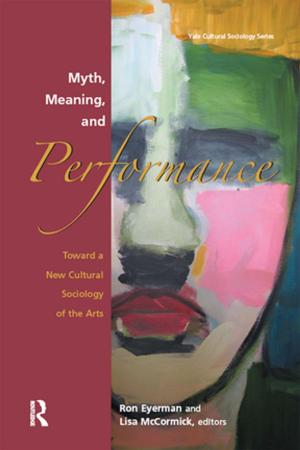| Author: | ISBN: | 9781351401890 | |
| Publisher: | Taylor and Francis | Publication: | September 3, 2018 |
| Imprint: | Routledge | Language: | English |
| Author: | |
| ISBN: | 9781351401890 |
| Publisher: | Taylor and Francis |
| Publication: | September 3, 2018 |
| Imprint: | Routledge |
| Language: | English |
Nothing rings truer to those teaching political science research methods: students hate taking this course. Tackle the challenge and turn the standard research methods teaching model on its head with Political Science Research in Practice. Akan Malici and Elizabeth S. Smith engage students first with pressing political questions and then demonstrate how a researcher has gone about answering them, walking them through real political science research that contributors have conducted. Through the exemplary use of a comparative case study, field research, interviews, textual and interpretive research, statistical research, survey research, public policy and program evaluation, content analysis, and field experiments, each chapter introduces students to a method of empirical inquiry through a specific topic that will spark their interest and curiosity. Each chapter shows the process of developing a research question, how and why a particular method was used, and the rewards and challenges discovered along the way. Students can better appreciate why we need a science of politics—why methods matter—with these first-hand, issue-based discussions.
The second edition now includes:
- Two completely new chapters on field experiments and a chapter on the textual/interpretative method.
- New topics, ranging from the Arab Spring to political torture to politically sensitive research in China to social networking and voter turnout.
- Revised and updated "Exercises and Discussion Questions" sections.
- Revised and updated "Interested to Know More" and "Recommended Resources" sections.
Nothing rings truer to those teaching political science research methods: students hate taking this course. Tackle the challenge and turn the standard research methods teaching model on its head with Political Science Research in Practice. Akan Malici and Elizabeth S. Smith engage students first with pressing political questions and then demonstrate how a researcher has gone about answering them, walking them through real political science research that contributors have conducted. Through the exemplary use of a comparative case study, field research, interviews, textual and interpretive research, statistical research, survey research, public policy and program evaluation, content analysis, and field experiments, each chapter introduces students to a method of empirical inquiry through a specific topic that will spark their interest and curiosity. Each chapter shows the process of developing a research question, how and why a particular method was used, and the rewards and challenges discovered along the way. Students can better appreciate why we need a science of politics—why methods matter—with these first-hand, issue-based discussions.
The second edition now includes:
- Two completely new chapters on field experiments and a chapter on the textual/interpretative method.
- New topics, ranging from the Arab Spring to political torture to politically sensitive research in China to social networking and voter turnout.
- Revised and updated "Exercises and Discussion Questions" sections.
- Revised and updated "Interested to Know More" and "Recommended Resources" sections.















